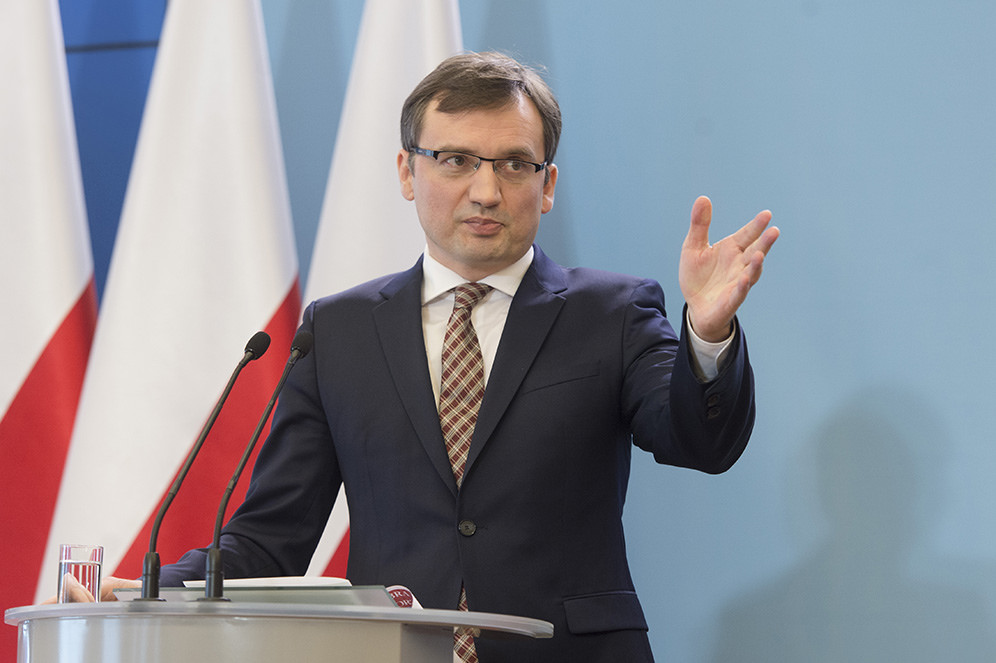A leading Polish website, Wirtualna Polska (WP), published hundreds of articles written under the names of fake journalists offering positive coverage of institutions including the justice ministry and state-owned companies, according to Wirtualne Media, a website focused on the media industry.
The story began to emerge last week, when OKO.press, an investigative and fact-checking website, reported that articles criticising Poland’s justice ministry had been blocked, censored or deleted by WP. Journalists were allegedly obliged to consult with the justice minister’s wife before publication.
According to sources quoted by OKO.press, Tomasz Machała, the deputy head of WP, told employees during an internal meeting that the company had “many business interests” in common with the justice ministry, and that staff salaries depended on them.
Separately, Wirtualne Media reported that WP and other websites belonging to the same media group, including Money.pl, published over 300 articles under the names of two fake journalists (who had also been identified by OKO.press).
Some of the articles praised institutions, including justice ministry, as well as various private and state-owned companies, and criticised labour unions. The articles were presented as normal news stories, with no indication that they were sponsored content.
"Disinformation on the internet is widespread. Poles are constantly being deceived and manipulated."
This is an article by Krzysztof Suwart. Krzysztof Suwart doesn't exist. He's a sock puppet created to write articles actual journalists won't put their names to. pic.twitter.com/aHKVGpDcny
— Ben Stanley (@BDStanley) January 22, 2020
In terms of properly marked advertising, the justice ministry appears to be among WP’s biggest clients, according to analysis by Kantar, a research company, and reported by OKO.press. Last year, WP displayed advertising for the ministry that would be worth over 125 million zloty – more than for any other client.
It is not know how much the ministry actually paid WP. But Kantar found that in 2019 the ministry spent 171.5 million zloty in total on all advertising, a huge jump from 2018, when the figure was 4.8 million zloty.
OKO.press alleged that this extra money could have come from the Justice Fund, which is intended to help victims and witnesses of crime but, since a 2017 change in the law, can also be devoted to “crime prevention”. This includes things such as publications, awareness campaigns and conferences.
In 2019, the Justice Fund spent 32 million zloty on a promotion campaign with the goal of “building the image of the Fund as needed and necessary”.
25m zl from a fund for victims of crime was illegally transferred by the justice ministry to the Central Anticorruption Bureau (CBA), finds the Supreme Audit Office (NIK). 'It is illegal and dangerous for the state,' they tell a parliamentary committee https://t.co/nkudxZCzAb
— Notes from Poland ?? (@notesfrompoland) June 13, 2018
In reply to OKO.press’s allegations, WP published a statement claiming that “the article contains lies, half-truths and slander”. It says that “Wirtualna Polska does not favour any politicians”, and quoted a report by the Institute for Media Monitoring, which stated that Justice Minister Zbigniew Ziobro was the government figure most criticised by WP publications.
WP is and will be “a completely independent and pluralist” outlet, read the statement. However, the company’s spokesperson announced that Machała was taking a leave of absence.
According to OKO.press, the justice ministry also sent them a demand to remove “false information” from their reports within three hours or legal action would be taken against them. The “obvious purpose” of their article “was to undermine trust in the ministry”, read the demand.
The website, however, stands by its story, and says that the ministry’s accusations regarding false information are “completely unfounded”.
Main image credit: P.Tracz/KPRM/Flickr (under public domain)

Monika Prończuk is the deputy editor of Notes from Poland. She was previously the Nico Colchester fellow at the Financial Times, acting FT Poland correspondent, and journalist at OKO.press, an independent fact-checking media outlet. Her articles have appeared in Quartz, Financial Times, Politico, Gazeta Wyborcza and Tygodnik Powszechny.




















